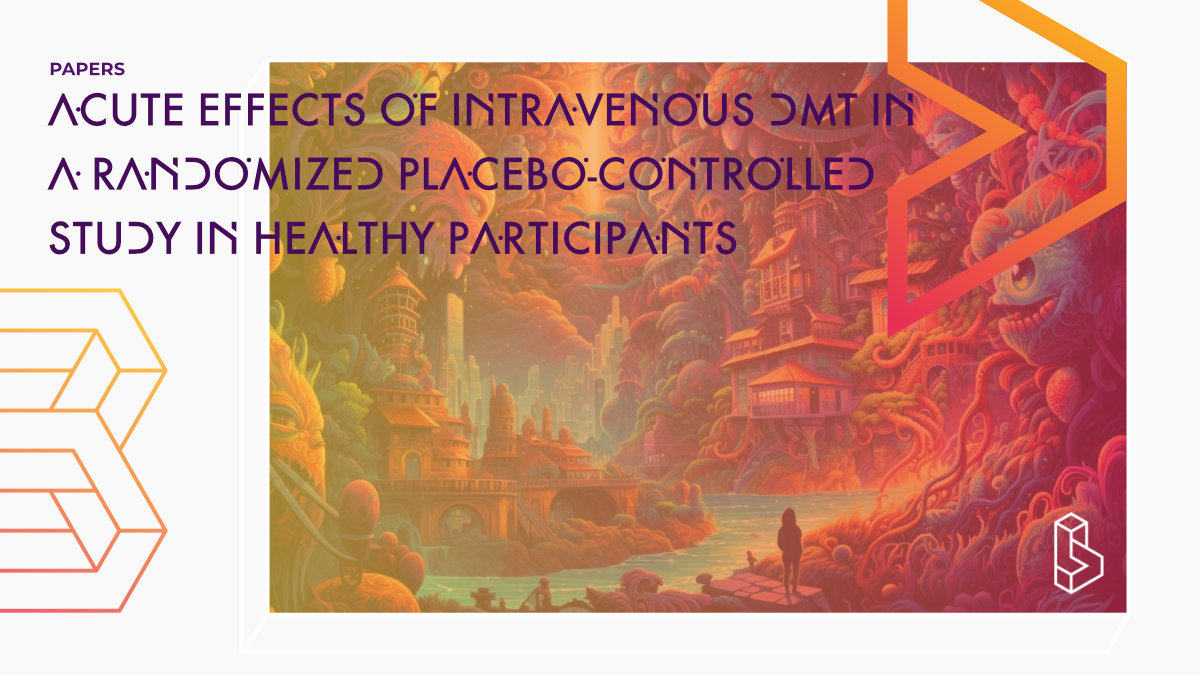This double-blind, placebo-controlled crossover study (n=27) investigated different intravenous DMT administration regimens, including placebo, low and high infusion (0.6-1mg/min), and bolus doses (15-25mg) combined with low and high infusion. The study found that bolus doses rapidly induced intense psychedelic effects, with infusions causing slowly increasing, dose-dependent effects. Despite the plasma concentrations of DMT increasing over time, the subjective effects experienced by individuals remained consistent from 30 to 90 minutes. This suggests that there is acute tolerance to the continuous administration of DMT. Both bolus doses produced more negative subjective effects and anxiety than infusions, and all effects rapidly subsided within 15 minutes after stopping the infusion.
Abstract of Acute effects of IV DMT in an RCT in healthy participants
“N,N-dimethyltryptamine (DMT) is distinct among classic serotonergic psychedelics because of its short-lasting effects when administered intravenously. Despite growing interest in the experimental and therapeutic use of intravenous DMT, data are lacking on its clinical pharmacology. We conducted a double-blind, randomized, placebo-controlled crossover trial in 27 healthy participants to test different intravenous DMT administration regimens: placebo, low infusion (0.6 mg/min), high infusion (1 mg/min), low bolus + low infusion (15 mg + 0.6 mg/min), and high bolus + high infusion (25 mg + 1 mg/min). Study sessions lasted for 5 h and were separated by at least 1 week. Participant’s lifetime use of psychedelics was ≤20 times. Outcome measures included subjective, autonomic, and adverse effects, pharmacokinetics of DMT, and plasma levels of brain-derived nvogteurotropic factor (BDNF) and oxytocin. Low (15 mg) and high (25 mg) DMT bolus doses rapidly induced very intense psychedelic effects that peaked within 2 min. DMT infusions (0.6 or 1 mg/min) without a bolus induced slowly increasing and dose-dependent psychedelic effects that reached plateaus after 30 min. Both bolus doses produced more negative subjective effects and anxiety than infusions. After stopping the infusion, all drug effects rapidly decreased and completely subsided within 15 min, consistent with a short early plasma elimination half-life (t1/2α) of 5.0–5.8 min, followed by longer late elimination (t1/2β = 14–16 min) after 15–20 min. Subjective effects of DMT were stable from 30 to 90 min, despite further increasing plasma concentrations, thus indicating acute tolerance to continuous DMT administration. Intravenous DMT, particularly when administered as an infusion, is a promising tool for the controlled induction of a psychedelic state that can be tailored to the specific needs of patients and therapeutic sessions.”
Authors: Severin B. Vogt, Laura Ley, Livio Erne, Isabelle Straumann, Anna M. Becker, Aaron Klaiber, Friederike Holze, Anja Vandersmissen, Lorenz Mueller, Urs Duthaler, Deborah Rudin, Dino Luethi, Nimmy Varghese, Anne Eckert & Matthias E. Liechti
Summary of Acute effects of IV DMT in an RCT in healthy participants
DMT is a naturally occurring psychedelic used in ayahuasca for recreational and spiritual purposes. It can be used intravenously, intramuscularly, and by inhalation to induce a psychedelic experience without the potentially additive psychoactive effects of MAO inhibitors. The first studies with DMT or similar chemical analogues began in the 1950s, and intravenous administration was investigated in the 1990s.
DMT was found to be fully hallucinogenic at doses of 0.2 and 0.4 mg/kg (15 and 30 mg, respectively). Two recent studies investigated DMT administration as a single intravenous bolus. The present study investigated different administration regimens of intravenous DMT designed to induce a psychedelic state over 90 min, including two continuous infusion doses and combinations of initial loading bolus doses.
DMT induces subjective effects via activating serotonin 5-hydroxytryptamine 2A receptors, similar to other classic psychedelics, including lysergic acid diethylamide (LSD) and psilocybin. DMT may also alter plasma levels of oxytocin and brain-derived neurotrophic factor.
Find this paper
Acute effects of intravenous DMT in a randomized placebo-controlled study in healthy participants
https://doi.org/10.1038/s41398-023-02477-4
Open Access | Google Scholar | Backup | 🕊
Cite this paper (APA)
Vogt, S. B., Ley, L., Erne, L., Straumann, I., Becker, A. M., Klaiber, A., ... & Liechti, M. E. (2023). Acute effects of intravenous DMT in a randomized placebo-controlled study in healthy participants. Translational Psychiatry, 13(1), 172.
Study details
Topics studied
Healthy Subjects
Neurocognitive Disorders
Study characteristics
Original
Double-Blind
Within-Subject
Randomized
Participants
27
Humans
Authors
Authors associated with this publication with profiles on Blossom
Matthias LiechtiMatthias Emanuel Liechti is the research group leader at the Liechti Lab at the University of Basel.
Institutes
Institutes associated with this publication
University of BaselThe University of Basel Department of Biomedicine hosts the Liechti Lab research group, headed by Matthias Liechti.
Compound Details
The psychedelics given at which dose and how many times
DMT 15 - 25mg | 4x
Linked Research Papers
Notable research papers that build on or are influenced by this paper
Psychological and physiological effects of extended DMTIn this within-subject, placebo-controlled study (n=11), participants received four doses of DMT (6-18 mg bolus + infusion over 30 minutes). Subjective effects were kept stable over the infusion, while plasma DMT concentrations increased (indicating acute psychological tolerance). Findings indicate that extended DMT infusion is safe and effective in healthy subjects.
Linked Clinical Trial
Effects of Dimethyltryptamine in Healthy SubjectsThis double-blind, placebo-controlled crossover trial (n=31) aims to investigate the effects of N,N-dimethyltryptamine (DMT) in healthy subjects. DMT is a naturally-occurring psychedelic substance commonly used in recreational and spiritual contexts. The study focuses on intravenous administration of DMT to induce an altered state of consciousness.

